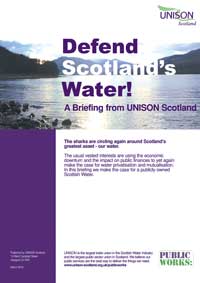 UNISON Scotland today comprehensively rejected the Independent Budget Review proposals as an assault on public services that will damage the economy.
UNISON Scotland today comprehensively rejected the Independent Budget Review proposals as an assault on public services that will damage the economy.
Scottish Organiser Glyn Hawker said:
“This is not an attempt to balance the books. It is a major assault on vital public services and it is about opening up profit opportunities for the fat cats.
“The report hides behind a rhetoric of ‘tough choices’ and ‘targeting’, but what these proposals will do is reduce the quality of life for all but the richest, as the services we use are removed or run down.
“Once the Scottish people realise that this means handing over their water service to the bankers, reducing the quality of their child’s education and cutting back on their elderly relatives’ care, they will reject this agenda.”
As well as up to 60,000 job losses, the report includes a range of proposals that run the risk of putting us back into recession.
Glyn added:
“Job losses on this scale will of course hit services. And their insistence on redundancies and pay freezes run the risk of taking us back into recession. With 70p in every pound spent on public services finding its way back into the local economy the programme of mass redundancies and real terms wage cuts will be a real blow to many local economies across Scotland.”
UNISON, the largest public services union, has said all along that the real issue is the kind of services our society wants and how we pay for them. It is wrong for politicians to be willing to make cuts on such a scale, yet not to consider fair taxation. The Scottish Parliament has tax varying powers and the people of Scotland voted for it to have them.
The report suggests the council tax freeze is unsustainable and that is correct, but UNISON would also say it is unsustainable not to look at asking those who can pay more in tax to do so.
Glyn said:
“Cuts on this scale will hit middle and low income families hard and will be especially hard on women. If classroom assistants lose their jobs, mums will be expected to volunteer. They also face cuts in before and after school services that could affect whether they can work.”
UNISON response to the Report’s chapter conclusions and recommendations:
Public Spending Environment
UNISON believes all public services are valuable, and should be ring fenced. Why should the ordinary people of Scotland pay for the bankers’ greed? Let us be clear though - the Independent Budget Review argues for a policy of no protected areas in public sector: this means health and education will face cuts along with the rest of our public services.
Fair taxes and government borrowing remain the most cost-effective ways of funding public spending.
Efficiency
The Review accepts that efficiencies will become ever more "challenging" - and then sets a minimum 2% annual efficiency target. The real agenda however is revealed in the well worn recommendations for shared services arrangements across the public sector; and "mainstream roles" for the private and voluntary/third sectors in the delivery of public services. These are not plans for efficient and effective public services - they are in fact costly and inefficient ways of opening up public services to profiteers.
Remuneration and workforce
The loss of up to 60,000 jobs will have a major impact on services. The proper place to deal with public sector pay is in negotiations. Pay freezes and pay cuts for public service workers will damage economic recovery, and hit local communities and small businesses too. UNISON will continue to campaign for fair pay as inflation rises around 5%.
Flexibility would open up issues of equal pay which we are only now resolving after 40 years of the Equal Pay Act.
Universal services
Introducing charges and means testing to services that currently benefit everyone creates an expensive new bureaucracy. If there is a concern that some people are receiving services they can well afford, the value for money option is to charge them via taxation rather than setting up a ‘department for social insecurity’ to administer charging.
Capital
Scottish Water should remain in democratic control. Setting it up as a ‘public interest company’ would be privatisation by stealth.
An enhanced role for the Scottish Futures Trust is likely to see further wasteful use of private financing for public sector projects. Lessons must be learned from the hugely expensive PFI/PPP projects.
Shaping the future
Scotland’s Parliament should provide leadership by working to fund quality public services and resisting a cuts and privatisation agenda.
ends
Notes to Editors:
1. UNISON responses to the report, including two earlier releases today, are here on our frequently updated blog at: http://unison-scotland.blogspot.com/
2. UNISON’s alternative budget is at: www.unison.org.uk/acrobat/18887.pdf
3. UNISON’s submission to the Independent Budget Review is at: http://www.unison-scotland.org.uk/response/UNISONResponse_IndependentBudgetReviewApril2010.pdf
For Further Information Please Contact:
Glyn Hawker, Scottish Organiser (Bargaining & Equal Pay) 07876 441 237
Fiona Montgomery, Communications Officer 0141 342 2877 (o) 07908 672 890 (m)
Malcolm Burns, Communications Officer 0141 342 2877 (o) 07958 063 182 (m)






